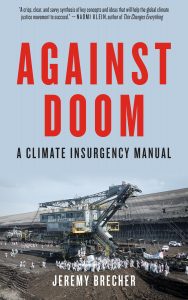by Steve Chase
Friends Journal
November 1st, 2017
…Another book that offers a positive and smart take on the challenges we face is Jeremy Brecher’s Against Doom: A Climate Insurgency Manual. It also argues that we can work with our neighbors and engage in effective and strategic action—in this case, to limit catastrophic climate change and transition to a just and climate-safe world.
Brecher starts his very first chapter, “This Is What Insurgency Looks Like,” by describing a church-based planning meeting for a nonviolent civil resistance action by residents and supporters of a predominantly low-income, African American neighborhood in Albany, N.Y. As Brecher writes, “They were organizing a protest against trains carrying potentially explosive oil—dubbed by the residents ‘bomb trains’—that were running through their neighborhood.” This action was part of 350.org’s May 2016 “Break Free from Fossil Fuels” civil disobedience campaign that involved hundreds of thousands of people on six continents nonviolently interfering with key elements of the fossil fuels industry in their communities in the space of one week.
The Albany action was not an ultra-leftist affair using a “diversity of tactics,” which is just a term used by self-righteous “radicals” to market feel-good but unstrategic violence. Instead, the action was populist, well-organized, and very disciplined. As Brecher notes, “Participants agreed ‘not to harm people or property;’ to be ‘dignified in dress, demeanor, and language;’ to attend action training; and to act ‘in accordance with the group’s agreed plan for action.’” Their particular action included 1,500 people marching to the train tracks for a spirited celebration of their democratic right to protect their community from harm. Then 500 of them put their bodies on the line to “illegally” blockade the train tracks so no “bomb trains” would pass through their community—or the communities of others.
I put “illegally” in quotes because the participants did not see themselves as criminals. They saw themselves as the people in their community who were willing to defend the law. As Brecher reports, many climate insurgents “have begun to define themselves—to the movement, the public, and the courts—not as criminals, but as law enforcers trying to protect legal rights and halt governments and corporations from committing the greatest crime in human history.”
This is an important reframing because one of the main barriers keeping many “climate worriers” from becoming bold and creative “climate warriors” is their deep-seated self-images as respectable, law abiding citizens who do not engage in improper behavior. If you are like me, you have probably heard many Quakers say, “I could never take part in civil disobedience or risk arrest.” You may have even said it yourself.
Yet what if this version of being “law abiding” is just an unfaithful, inaccurate, and unhelpful way to look at our situation? What if by not taking part in nonviolent civil resistance and just staying passive—or even staying completely locked into the domesticated and rigged “normal channels” of elections, lobbying, and litigation—we are aiding and abetting government and corporate crimes against humanity, the public trust, and the planet?
I wish I had the space to describe in much more depth Brecher’s thoughtful discussions. He describes his view of the public trust doctrine, his vision of a just transition, and the value of building alternative institutions. He spells out his theory of change for a nonviolent global climate insurgency, and how we can involve more people in extended climate insurgency campaigns and increase their effectiveness. He describes how an organized civil resistance movement can effectively undermine the pillars of support for government and corporate climate criminals over time. This occurs when more and more of us follow Gandhi’s path and collectively “withdraw our acquiescence and cooperation from those who are destroying our planet.”
As a Quaker activist and someone who works for the International Center on Nonviolent Conflict, which promotes the study and use of nonviolent civil resistance in social movements, I heartily recommend reading and discussing Brecher’s important new book. Both of these books remind us that there is a world to win and that what we choose to do matters.






